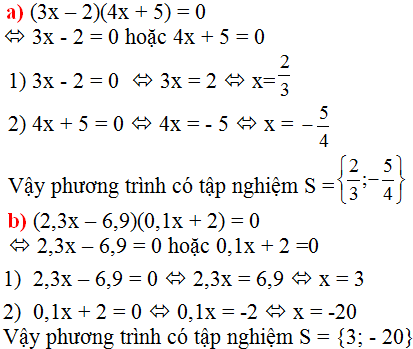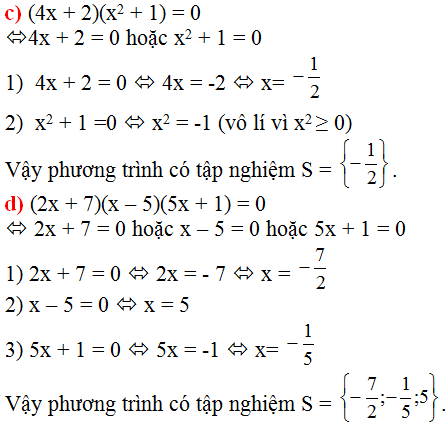
Hãy nhập câu hỏi của bạn vào đây, nếu là tài khoản VIP, bạn sẽ được ưu tiên trả lời.


a)\(1,2-x+0,8=-1,8-2x\)
\(2-x=-1,8-2x\)
\(2x-x=-1,8-2\)
\(x=-3,8\)
Vậy S={-3,8}
b)\(2,3x-1,4-4x=3,6-1,7x\)
\(2,3x-4x+1,7x=3,6+1,4\)
0=5(vô lí)
Vậy S={\(\varnothing\)}
c)\(6,6-0.9=2,6+0,1x-4\)
\(5,7=0,1x-1,4\)
\(-4,3=0,1x\)
\(x=-43\)

a) Ta có: 3x-6=0
⇔3(x-2)=0
mà 3≠0
nên x-2=0
hay x=2
Vậy: x=2
b) Ta có: (2x+6)(2x+12)=0
⇔\(2\left(x+3\right)\cdot2\cdot\left(x+6\right)=0\)
mà 2≠0
nên \(\left[{}\begin{matrix}x+3=0\\x+6=0\end{matrix}\right.\Leftrightarrow\left[{}\begin{matrix}x=-3\\x=-6\end{matrix}\right.\)
Vậy: x∈{-3;-6}
c) Ta có: 2x-36=0
⇔2(x-18)=0
mà 2≠0
nên x-18=0
hay x=18
Vậy: x=18
d) ĐKXĐ: x∉{-1;2}
Ta có: \(\frac{1}{x+1}-\frac{5}{x-2}=\frac{-15}{\left(x+1\right)\left(x-2\right)}\)
\(\Leftrightarrow\frac{x-2}{\left(x+1\right)\left(x-2\right)}-\frac{5\left(x+1\right)}{\left(x-2\right)\left(x+1\right)}=\frac{-15}{\left(x+1\right)\left(x-2\right)}\)
\(\Leftrightarrow x-2-5\left(x+1\right)=-15\)
\(\Leftrightarrow x-2-5x-5+15=0\)
\(\Leftrightarrow-4x+8=0\)
\(\Leftrightarrow-4\left(x-2\right)=0\)
mà -4≠0
nên x-2=0
hay x=2(ktm)
Vậy: x∈∅

\(2x\left(x+2\right)^2-8x^2=2\left(x-2\right)\left(x^2+2x+4\right)\)
\(\Leftrightarrow2x\left(x^2+4x+4\right)-8x^2=2\left(x^3-8\right)\)
\(\Leftrightarrow2x^3+8x^2+8x-8x^2=2x^3-16\)
\(\Leftrightarrow8x=-16\)
\(\Leftrightarrow x=-2\)

Lời giải :
Đặt \(\hept{\begin{cases}x^2+3x-4=a\\2x^2-5x+3=b\end{cases}}\)
\(\Rightarrow a+b=\left(x^2+3x-4\right)+\left(2x^2-5x+3\right)=3x^2-2x-1\)
Khi đó phương trình đã cho trở thành :
\(a^3+b^3=\left(a+b\right)^3\)
\(\Leftrightarrow a^3+b^3=a^3+b^3+3ab.\left(a+b\right)\)
\(\Leftrightarrow3ab.\left(a+b\right)=0\) \(\Rightarrow\orbr{\begin{cases}a+b=0\\ab=0\end{cases}}\)
+) Với \(a+b=0\Rightarrow3x^2-2x-1=0\)
\(\Leftrightarrow\left(x-1\right)\left(3x+1\right)=0\)
\(\Leftrightarrow\orbr{\begin{cases}x=1\\x=-\frac{1}{3}\end{cases}}\)
+) Với \(ab=0\Rightarrow\left(x^2+3x-4\right).\left(2x^2-5x+3\right)=0\)
\(\Leftrightarrow\orbr{\begin{cases}x^2+3x-4=0\left(1\right)\\2x^2-5x+3=0\left(2\right)\end{cases}}\)
Pt (1) \(\Leftrightarrow\left(x-1\right)\left(x+4\right)=0\Leftrightarrow\orbr{\begin{cases}x=1\\x=-4\end{cases}}\)
Pt (2) \(\Leftrightarrow\left(x-1\right)\left(2x-3\right)=0\Leftrightarrow\orbr{\begin{cases}x=1\\x=\frac{3}{2}\end{cases}}\)
Vạy phương trình đã cho có tập nghiệm \(S=\left\{-4,-\frac{1}{3},1,\frac{3}{2}\right\}\)

Làm cho bạn 1 con thôi dài quá trôi hết màn hình:
c) có vẻ khó nhất (con khác tương tự)
đặt 2x+2=t=> x+1=t/2
\(\left(t-1\right).\left(\frac{t}{2}\right)^{^2}.\left(t+1\right)=18\Leftrightarrow\left(t^2-1\right)t^2=4.18\)
\(t^4-t^2=4.18\Leftrightarrow y^2-2.\frac{1}{2}y+\frac{1}{4}=4.18+\frac{1}{4}=\frac{16.18+1}{4}=\left(\frac{17}{2}\right)^2\)
<=> \(\left(y-\frac{1}{2}\right)^{^2}=\left(\frac{17}{2}\right)^2\Rightarrow\left[\begin{matrix}y=\frac{1}{2}-\frac{17}{2}=-8\\y=\frac{1}{2}+\frac{17}{2}=9\end{matrix}\right.\Rightarrow\left[\begin{matrix}2x+2=-8\Rightarrow x=-5\\2x+2=9\Rightarrow x=\frac{7}{2}\end{matrix}\right.\)

\(\Leftrightarrow\left(x+1\right)^2=4\left(x-1\right)^4\).Xét 2 trường hợp:
-Với x>=1.PT tương đương
\(x+1=2\left(x-1\right)^2\)
\(\Leftrightarrow x+1=2x^2-4x+2\)
\(\Leftrightarrow2x^2-5x+1=0\)
\(\Leftrightarrow2\left(x^2-\frac{5}{2}x+\frac{25}{8}\right)-\frac{21}{4}=0\).Giải típ nhá đưa 2 hiệu 2 bình phương
-Với x<1.PT tương đương
\(x+1=-2\left(x-1\right)^2\)
\(\Leftrightarrow x+1=-2x^2+4x-2\)
\(\Leftrightarrow-2x^2+3x-3=0\Leftrightarrow2x^2-3x+3=0\)
\(\Leftrightarrow\left(2x^2-3x+\frac{9}{8}\right)+\frac{15}{8}=0\Leftrightarrow\left(\sqrt{2}x-\frac{3}{2\sqrt{2}}^{ }\right)^2+\frac{15}{8}>0\)(vô nghiệm)
\( {\left( {x + 1} \right)^2} = 4{\left( {{x^2} - 2x + 1} \right)^2}\\ \Leftrightarrow {\left( {x + 1} \right)^2} = 4{\left[ {{{\left( {x - 1} \right)}^2}} \right]^2}\\ \Leftrightarrow \dfrac{{{{\left( {x + 1} \right)}^2}}}{{{{\left( {x - 1} \right)}^4}}} = 4\\ \Leftrightarrow {\left[ {\dfrac{{x + 1}}{{{{\left( {x - 1} \right)}^2}}}} \right]^2} = 4\\ \Leftrightarrow \dfrac{{x + 1}}{{{{\left( {x - 1} \right)}^2}}} = 2\\ \Leftrightarrow x + 1 = 2{\left( {x - 1} \right)^2}\\ \Leftrightarrow x + 1 = 2{x^2} - 4x + 2\\ \Leftrightarrow 2{x^2} - 5x + 1 = 0\\ \Leftrightarrow \left[ \begin{array}{l} x = \dfrac{{5 - \sqrt {17} }}{4}\\ x = \dfrac{{5 + \sqrt {17} }}{4} \end{array} \right.\)


\(\Leftrightarrow2,3x-1,4-4x=36-4,7x\Leftrightarrow3x=37,4\Leftrightarrow x=\dfrac{37,4}{3}\)
\(2,3x-2\left(0,7+2x\right)=36-4,7x\\ \Leftrightarrow2,3x-1,4-4x-36+4,7x=0\)
\(\Leftrightarrow3x-37,4=0\\ \Leftrightarrow x=\dfrac{187}{15}\)